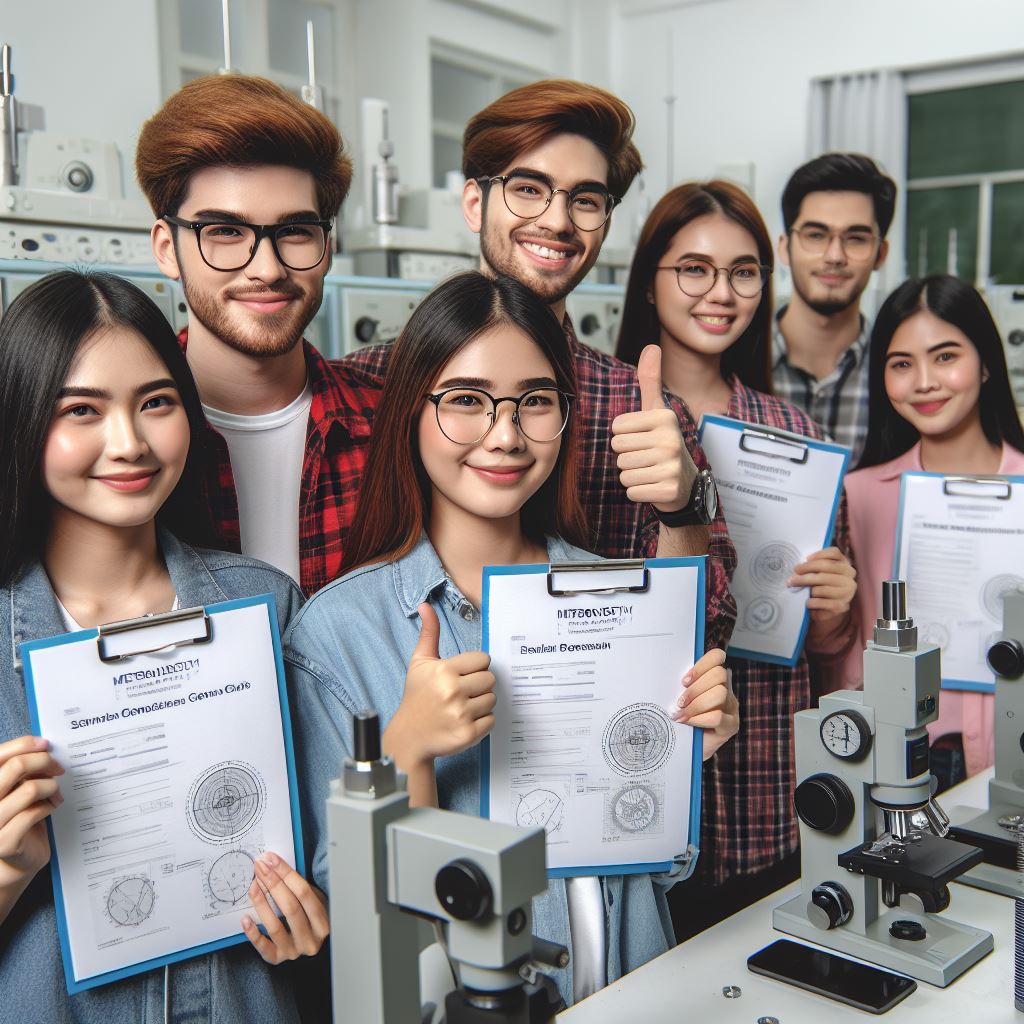
Microelectronics Metrology Certificate
In order to develop talent and workforce supporting the CHIPS Act mission, MRTL offers an undergraduate Microelectronics Metrology Certificate program, providing students with the knowledge and skills they need to succeed in the semiconductor metrology field. The program focuses on the measurement of critical dimensions, materials properties, and electrical parameters in semiconductor devices. The certificate program will target current degree-seeking students in electrical engineering, computer engineering, software engineering, mechanical engineering, physics, material sciences, and chemistry. Students will be enrolled into this certificate program once a year (starting in a fall semester and completing in the next summer semester) as a cohort. Later, we will extend this metrology training to community college students and high school CTE students. The objectives of the Microelectronics Metrology Certificate program are to:
- Provide students with a comprehensive understanding of measurement principles, techniques, and methodologies relevant to the semiconductor industry.
- Equip students with the necessary skills to operate, calibrate, and maintain advanced metrology instruments used in semiconductor fabrication facilities.
- Foster critical thinking, problem-solving, knowledge creation and translation abilities to address real-world challenges in semiconductor manufacturing and metrology.
- Train students to interpret and analyze metrology data to optimize semiconductor process parameters and enhance device performance.
- Cultivate strong ethical values, leadership skills, and effective communication to excel in diverse professional environments.
As specified below, seven (7) new courses will be developed and offered at NAU's Flagstaff Mountain Campus and the North Valley Campus (NVC) located at 15451 N 28th Ave, Phoenix, AZ 85053.
- MET 201: Microelectronics Metrology, 3 credit hours. Introduction to metrology principles and techniques used in semiconductor manufacturing. Covers measurement fundamentals, wafer inspection, mask/reticle inspection, optical critical dimension metrology, film thickness measurement, surface analysis, and contamination control.
- MET 202: Metrology for Advanced Materials and Devices, 3 credit hours. Metrology characterization methods for emerging microelectronics materials and device structures. Focuses on spectroscopy, microscopy, and electrical characterization approaches for advanced CMOS, memory, MEMS, photonic, and other devices.
- MET 207: Metrology Practice in Semiconductor Fabs, 3 credit hours. Hands-on metrology lab course and capstone project conducted onsite at a semiconductor fab facility. Provides practical experience with state-of-the-art metrology tools and workflows for manufacturing process control.
- MET 203: Metrology for Nanostructured Materials Characterization, 3 credit hours. Principles and techniques for dimensional, compositional, electrical, and thermal characterization of nanostructures and nanomaterials. Covers electron microscopy, scanning probe microscopy, x-ray diffraction, surface analysis, and other advanced methods.
- MET 204: Advanced Metrology for 3D Structures and Devices, 3 credit hours. Metrology approaches for complex 3D microelectronics structures including FinFETs, gate-all-around devices, and stacked devices. In-depth analysis of optical, electron beam, and probe-based techniques for dimensional and materials characterization.
- MET 205: Materials Characterization Metrology for Advanced Packaging, 3 credit hours. Overview of materials, interfaces, and defects analysis techniques critical for microelectronics packaging applications. Focuses on spectroscopy, microscopy, thermal/mechanical analysis, and other methods relevant to packaging materials and process control.
- MET 206: Statistical Analysis of Measurement Data, 3 credit hours. Fundamentals of uncertainty analysis, statistics, sampling methods, SPC, design of experiments, and data analytics applied to metrology and semiconductor process control.
These courses cover a wide range of semiconductor metrology, including fundamental theories and principles as well as experiential learning in a semiconductor fabrication plant. The Microelectronics Metrology Certificate program consists of 15 credit hours of coursework. Three core courses (9 credit hours) are required: MET 201, MET 402, and MET 207. Students can select two courses (6 credit hours) from MET 203, MET 204, MET 205, and MET 206. These courses will provide training in measurement science, uncertainty analysis, quality assurance, device physics, instrumentation, and calibration. The program offers specialized courses in semiconductor manufacturing processes, metrology techniques for thin films, optical critical dimension metrology, defect inspection, and semiconductor yield analysis.
Students will take advanced metrology lab courses to gain hands-on experience with modern metrology equipment and techniques used in semiconductor fabs. In addition, students are required to spend at least one semester taking MET 207 Metrology Practice in Semiconductor Fabs, which is a capstone course co-taught by NAU faculty and industry subject-matter-experts on the industry site, providing students the opportunity to apply their knowledge and skills to a real-world metrology problem. The curriculum emphasizes both theory and practical skills to prepare graduates for real- world careers in the semiconductor industry or high-tech advanced manufacturing.
To ensure the program's relevance and keep abreast of the latest advancements in the semiconductor industry, we have identified a group of industry partners whose subject-matter- experts and practitioners will be invited to deliver guest lectures and participate in joint research and educational projects. Each of these industry partners will have one representative serving on the Industry Advisory Board of the Microelectronics Metrology Certificate program. This collaboration will also facilitate internships, providing students with valuable real-world experience and potential job opportunities.